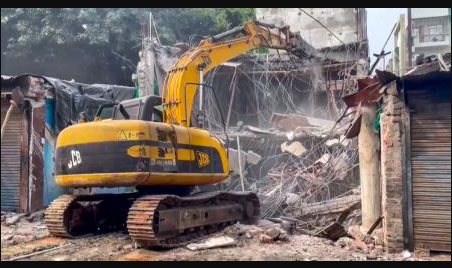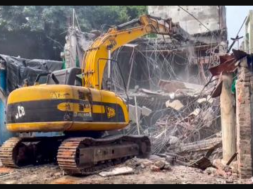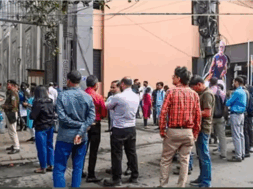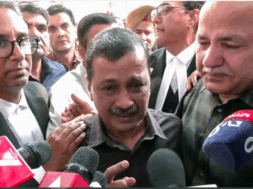
Unlawful Demolition of Houses: SC Pulls up UP Government, Prayagraj Development Authority
Manas Dasgupta
NEW DELHI, Apr 1: Coming down heavily on the Uttar Pradesh government and the Prayagraj Development Authority for bulldozer action in demolishing several houses without serving proper notices, the Supreme Court on Tuesday said such “illegal and insensitive actions” of the concerned authorities have “shaken the conscience of the court.”
Underlining that the demolition drive was “unconstitutional” and “inhuman,” the bench of Justice AS Oka and Justice Ujjal Bhuyan reminded that there was something like “rule of law in the country” and residential structures of citizens couldn’t be demolished in such fashion. “This shocks our conscience. There is something called right to shelter, due process of law,” adding that the residential premises of the appellants have been high-handedly demolished and ordered paying Rs 10 lakh compensation in each cases of homeowners who approached the court for relief within six weeks.
The court had slammed the UP government for razing the homes of a lawyer, a professor and some others without following due procedure. Advocate Zulfiqar Haider, Professor Ali Ahmed and three others, whose homes had been demolished, had told the court that they were given notices just one night before the bulldozer action.
The top court was hearing a plea by advocate Zulfiqar Haider, professor Ali Ahmed and others whose houses were demolished. The Allahabad High Court had earlier rejected their plea challenging the demolition. The petitioners had been reportedly served a notice on March 6, 2021 with respect to certain constructions at Lukerganj locality in Prayagraj.
The lawyer representing the petitioners had told the court that the authorities mistakenly identified the land on which their homes were built as belonging to gangster Atiq Ahmed, who was murdered in 2023.
“We will record this whole thing as illegal and we will say that as far as rights in the land are concerned, we are not offering any comment,” Justice Oka said, adding, “And fix compensation of 10 lakhs in each case. That is the only way to do this. So that this authority will always remember to follow due process.”
“The authorities, and especially the development authority, must remember that the right to shelter is also an integral part of Article 21 of the Constitution of India,” the order stated. “Carrying out demolition in such a manner shows insensitivity on the part of the statutory development authority,” it added.
The court also pulled up the authorities for the manner in which the demolition notices were served. While the State counsel said the notices were affixed at the properties, the court questioned why the notices were not sent by registered post. “This affixing business must be stopped. They have lost their houses because of this… And fix compensation of Rs 10 lakh in each case. That is the only way to do this. So that this authority will always remember to follow due process,” Justice Oka said.
The court noted that those whose homes were demolished were not provided “reasonable opportunity” to respond to the notice. The court also referred to the viral video of a demolition drive in Uttar Pradesh’s Ambedkar Nagar, in which a girl was seen holding her books close as a bulldozer razed homes. “Everyone is upset about such scenes,” Justice Bhuyan said.
The apex court had previously slammed the Uttar Pradesh government over the demolition action in Prayagraj without following the due legal procedure and said it sent a “shocking and wrong signal.”
The “bulldozer action” by several state governments, particularly the UP government, had been engaging the top court’s attention for some time. In September, last year, the Supreme Court had invited suggestions from the parties concerned to frame appropriate pan-India guidelines on extra-legal demolitions.
The order was issued in the wake of multiple instances of demolitions where the houses and building establishments of persons accused of certain crimes have been razed without following due process. These demolitions have become commonplace over the last few years, targeting vulnerable groups and often leaving them without any legal recourse.
This selective, yet arbitrary, state action has rendered the right to housing meaningless since evictions are brazenly carried out by local authorities, often at odd hours, without any alternative facility or engagement for rehabilitation. The inequality, social conflict and segregation that follow such action run the risk of intensifying the marginalisation of certain communities and go against the spirit of the Constitution and due process enshrined in criminal procedure laws.
Large-scale demolition drives as a means of collective punishment for rioters had become rampant. The practice was adhered to after communal skirmishes in Nuh in Haryana, Khargone in Madhya Pradesh and more recently in Nagpur in Maharashtra. In each of these cases, the demolition was justified under municipal laws either on account of action against encroachment or under the pretext of unauthorised construction completely bypassing the due process of law before such demolitions.
In light of overarching principles of human rights, constitutional values and social justice, there is a strong need to formulate guidelines and re-imagine the existing legal framework which bestows unbridled executive power on municipal authorities to order and execute such demolitions, the apex court had felt.













